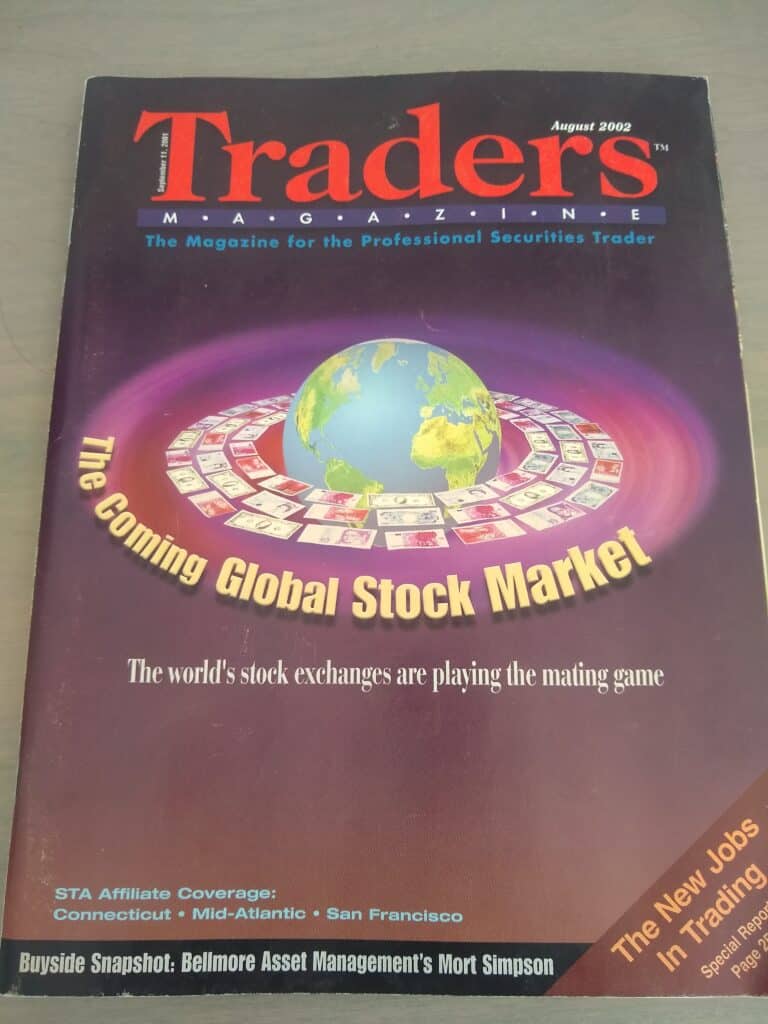FLASH FRIDAY is a weekly content series looking at the past, present and future of capital markets trading and technology. FLASH FRIDAY is sponsored by Instinet, a Nomura company.
As Yogi Berra said, it’s tough to make predictions, especially about the future.
Flying cars and jetpacks are a couple societal predictions, dating back to the 1939 World’s Fair, that have yet to come true. In 2007, a Bloomberg columnist famously wrote that Apple’s new iPhone “won’t make a long-term mark on the industry.” More recently, many economists predicted a U.S. recession in 2023.
We’re not here just to critique others; indeed, Traders Magazine itself is hardly immune to mispredicting the future.
To wit, see the August 2002 Traders cover story: “The Coming Global Stock Market”.

From the article:
“The world’s trading superpowers are working quietly behind the scenes on a long-held dream: A stock market that spans the globe.
It would work like this: Imagine, if you will, a stock market where trading in American shares begins at 3:00 a.m. New York time, just as Europeans are opening their morning newspapers. Or, if you will, a market in which U.S. investors can buy Volkswagen as easily as General Motors.
That may happen sooner than expected. For the most part, the world’s stock exchanges have remained local affairs, sticking to their own national or regional knitting. But the next few months may produce the world’s first super-exchange, industry sources tell Traders Magazine.”
The article went on to cite speculation that the London Stock Exchange and Nasdaq were headed toward a merger. “All the players have the same dream: to create a more efficient market by merging liquidity pools…To benefit brokers and investors, the best scenario would be an out-and-out merger that creates a single corporate organization and one seamless marketplace.”
More than two decades later, there is no panglobal exchange, and there’s no inkling of one in the works. What happened?
Reuters provided a good long-term LSE perspective in its 2019 article Timeline: LSE – A story of failed mega-mergers. Specific to Nasdaq, the article noted that in March 2006, LSE rejected a $4.2 billion offer from Nasdaq; the bid turned hostile and Nasdaq’s approach fell through in February 2007.
There was renewed interest in exchange mega-mergers in the early 2010s, but again the promise of a transatlantic mega-exchange proved elusive. If anything the industry underestimated nationalistic sentiment around a stock exchange, and by extension regulatory reactions to proposed mergers that would cede control of an exchange.
To be sure, the world’s largest exchange operators – Intercontinental Exchange, Nasdaq, Euronext, HKEX, LSEG et al – are more global than they used to be. But revenues from other regions are mostly from alliances, joint ventures and selling technology products and services, rather than cross-border trade execution.
The 2002 Traders article was reasonably prescient in spotting this trend by stating:
“More likely is some sort of ‘lite’ alliance in which a European and American exchange remain separate, keeping their existing regulators. In that case, they would surrender most of the potential cost savings and improvements in liquidity. That’s why an alliance looks more like a strategic than an economic move.”
And the wait for the global super-exchange continues.






